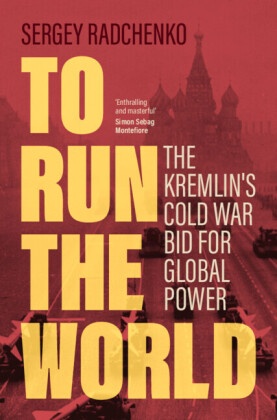To Run the World - The Kremlin's Cold War Bid for Global Power
| Verlag | Cambridge University Press |
| Auflage | 2024 |
| Seiten | 768 |
| Format | 16,4 x 4,5 x 23,6 cm |
| Gewicht | 1210 g |
| Artikeltyp | Englisches Buch |
| EAN | 9781108477352 |
| Bestell-Nr | 10847735UA |
Reveals how perennial insecurities, delusions of grandeur, and desire for recognition propelled Moscow on a headlong quest for global power.
What would it feel like To Run the World? The Soviet rulers spent the Cold War trying desperately to find out. In this panoramic new history of the conflict that defined the postwar era, Sergey Radchenko provides an unprecedented deep dive into the psychology of the Kremlin's decision-making. He reveals how the Soviet struggle with the United States and China reflected its irreconcilable ambitions as a self-proclaimed superpower and the leader of global revolution. This tension drove Soviet policies from Stalin's postwar scramble for territory to Khrushchev's reckless overseas adventurism and nuclear brinksmanship, Brezhnev's jockeying for influence in the third world, and Gorbachev's failed attempts to reinvent Moscow's claims to greatness. Perennial insecurities, delusions of grandeur, and desire for recognition propelled Moscow on a headlong quest for global power, with dire consequences and painful legacies that continue to shape our world.
Inhaltsverzeichnis:
Introduction; Part I. Ambition: 1. The Postwar; 2. The parting of ways; 3. Stalin in Europe; 4. Stalin in Asia; Part II. Hubris: 5. Love Us As We Are; 6. The Golden Hoop; 7. The Twin Crises; 8. Killing Flies; 9. Camp David; 10. Berlin; 11. Cuba; Part III. Decline: 12. Vietnam; 13. Detente; 14. Yom Kippur; 15. Decline; 16. Tensions Mount; 17. The Final Nail; Part IV. Collapse: 18. Fear; 19. Hope; 20. Collapse; Conclusion.
Rezension:
'The historiography of the Cold War was once too narrowly focused on two superpowers. More recently, it has become blurred by overemphasis on minor players. Sergey Radchenko's To Run the World brilliantly reconciles the two literatures. Using hitherto unavailable Russian and Chinese sources, he shows that the Cold War was from the outset a 'three-body problem,' with the Soviets seeking an unattainable parity with the United States, while China alternately attracted and repelled the other two. American policymakers in the 1960s and 1970s sought 'détente' with the Soviets, believing there could be 'linkage' to other issues of mutual interest. This was to underestimate the Soviet imperative to retain leadership of revolutionary forces around the world in a bitter competition with Beijing. This is a model of historical writing: scrupulously researched and elegantly presented, To Run the World shows how a volatile interplay of ideological, geopolitical, and psychological forces drove t he Cold War on its erratic path.' Niall Ferguson, Milbank Family Senior Fellow, the Hoover Institution, and author of Kissinger: 1923-1968: The Idealist

